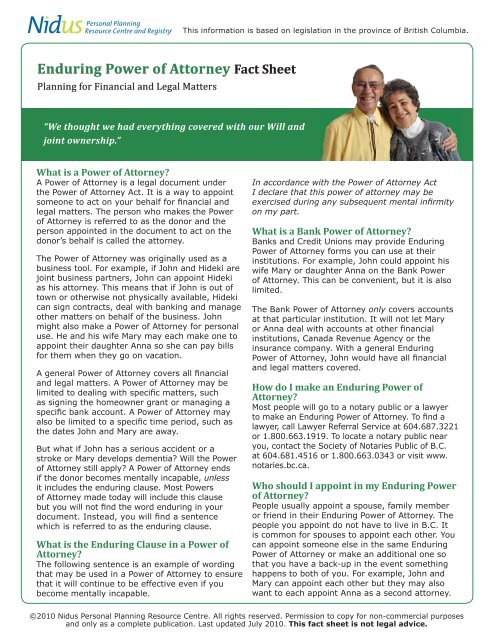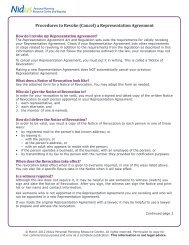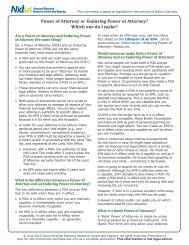Enduring Power of Attorney Fact Sheet - Nidus Personal Planning ...
Enduring Power of Attorney Fact Sheet - Nidus Personal Planning ...
Enduring Power of Attorney Fact Sheet - Nidus Personal Planning ...
You also want an ePaper? Increase the reach of your titles
YUMPU automatically turns print PDFs into web optimized ePapers that Google loves.
This information is based on legislation in the province <strong>of</strong> British Columbia.<br />
<strong>Enduring</strong> <strong>Power</strong> <strong>of</strong> <strong>Attorney</strong> <strong>Fact</strong> <strong>Sheet</strong><br />
<strong>Planning</strong> for Financial and Legal Matters<br />
“We thought we had everything covered with our Will and<br />
joint ownership.”<br />
What is a <strong>Power</strong> <strong>of</strong> <strong>Attorney</strong>?<br />
A <strong>Power</strong> <strong>of</strong> <strong>Attorney</strong> is a legal document under<br />
the <strong>Power</strong> <strong>of</strong> <strong>Attorney</strong> Act. It is a way to appoint<br />
someone to act on your behalf for financial and<br />
legal matters. The person who makes the <strong>Power</strong><br />
<strong>of</strong> <strong>Attorney</strong> is referred to as the donor and the<br />
person appointed in the document to act on the<br />
donor’s behalf is called the attorney.<br />
The <strong>Power</strong> <strong>of</strong> <strong>Attorney</strong> was originally used as a<br />
business tool. For example, if John and Hideki are<br />
joint business partners, John can appoint Hideki<br />
as his attorney. This means that if John is out <strong>of</strong><br />
town or otherwise not physically available, Hideki<br />
can sign contracts, deal with banking and manage<br />
other matters on behalf <strong>of</strong> the business. John<br />
might also make a <strong>Power</strong> <strong>of</strong> <strong>Attorney</strong> for personal<br />
use. He and his wife Mary may each make one to<br />
appoint their daughter Anna so she can pay bills<br />
for them when they go on vacation.<br />
A general <strong>Power</strong> <strong>of</strong> <strong>Attorney</strong> covers all financial<br />
and legal matters. A <strong>Power</strong> <strong>of</strong> <strong>Attorney</strong> may be<br />
limited to dealing with specific matters, such<br />
as signing the homeowner grant or managing a<br />
specific bank account. A <strong>Power</strong> <strong>of</strong> <strong>Attorney</strong> may<br />
also be limited to a specific time period, such as<br />
the dates John and Mary are away.<br />
But what if John has a serious accident or a<br />
stroke or Mary develops dementia? Will the <strong>Power</strong><br />
<strong>of</strong> <strong>Attorney</strong> still apply? A <strong>Power</strong> <strong>of</strong> <strong>Attorney</strong> ends<br />
if the donor becomes mentally incapable, unless<br />
it includes the enduring clause. Most <strong>Power</strong>s<br />
<strong>of</strong> <strong>Attorney</strong> made today will include this clause<br />
but you will not find the word enduring in your<br />
document. Instead, you will find a sentence<br />
which is referred to as the enduring clause.<br />
What is the <strong>Enduring</strong> Clause in a <strong>Power</strong> <strong>of</strong><br />
<strong>Attorney</strong>?<br />
The following sentence is an example <strong>of</strong> wording<br />
that may be used in a <strong>Power</strong> <strong>of</strong> <strong>Attorney</strong> to ensure<br />
that it will continue to be effective even if you<br />
become mentally incapable.<br />
In accordance with the <strong>Power</strong> <strong>of</strong> <strong>Attorney</strong> Act<br />
I declare that this power <strong>of</strong> attorney may be<br />
exercised during any subsequent mental infirmity<br />
on my part.<br />
What is a Bank <strong>Power</strong> <strong>of</strong> <strong>Attorney</strong>?<br />
Banks and Credit Unions may provide <strong>Enduring</strong><br />
<strong>Power</strong> <strong>of</strong> <strong>Attorney</strong> forms you can use at their<br />
institutions. For example, John could appoint his<br />
wife Mary or daughter Anna on the Bank <strong>Power</strong><br />
<strong>of</strong> <strong>Attorney</strong>. This can be convenient, but it is also<br />
limited.<br />
The Bank <strong>Power</strong> <strong>of</strong> <strong>Attorney</strong> only covers accounts<br />
at that particular institution. It will not let Mary<br />
or Anna deal with accounts at other financial<br />
institutions, Canada Revenue Agency or the<br />
insurance company. With a general <strong>Enduring</strong><br />
<strong>Power</strong> <strong>of</strong> <strong>Attorney</strong>, John would have all financial<br />
and legal matters covered.<br />
How do I make an <strong>Enduring</strong> <strong>Power</strong> <strong>of</strong><br />
<strong>Attorney</strong>?<br />
Most people will go to a notary public or a lawyer<br />
to make an <strong>Enduring</strong> <strong>Power</strong> <strong>of</strong> <strong>Attorney</strong>. To find a<br />
lawyer, call Lawyer Referral Service at 604.687.3221<br />
or 1.800.663.1919. To locate a notary public near<br />
you, contact the Society <strong>of</strong> Notaries Public <strong>of</strong> B.C.<br />
at 604.681.4516 or 1.800.663.0343 or visit www.<br />
notaries.bc.ca.<br />
Who should I appoint in my <strong>Enduring</strong> <strong>Power</strong><br />
<strong>of</strong> <strong>Attorney</strong>?<br />
People usually appoint a spouse, family member<br />
or friend in their <strong>Enduring</strong> <strong>Power</strong> <strong>of</strong> <strong>Attorney</strong>. The<br />
people you appoint do not have to live in B.C. It<br />
is common for spouses to appoint each other. You<br />
can appoint someone else in the same <strong>Enduring</strong><br />
<strong>Power</strong> <strong>of</strong> <strong>Attorney</strong> or make an additional one so<br />
that you have a back-up in the event something<br />
happens to both <strong>of</strong> you. For example, John and<br />
Mary can appoint each other but they may also<br />
want to each appoint Anna as a second attorney.<br />
©2010 <strong>Nidus</strong> <strong>Personal</strong> <strong>Planning</strong> Resource Centre. All rights reserved. Permission to copy for non-commercial purposes<br />
and only as a complete publication. Last updated July 2010. This fact sheet is not legal advice.
Sometimes people appoint a Trust Company, a<br />
Credit Union, or a pr<strong>of</strong>essional. These parties<br />
will charge a fee for their services and special<br />
wording is required in the <strong>Enduring</strong> <strong>Power</strong> <strong>of</strong><br />
<strong>Attorney</strong> to cover this.<br />
Who can make an <strong>Enduring</strong> <strong>Power</strong> <strong>of</strong><br />
<strong>Attorney</strong>?<br />
To make an <strong>Enduring</strong> <strong>Power</strong> <strong>of</strong> <strong>Attorney</strong> you must<br />
be considered mentally capable. The law requires<br />
that you understand the nature and effect <strong>of</strong><br />
signing an <strong>Enduring</strong> <strong>Power</strong> <strong>of</strong> <strong>Attorney</strong>. In general,<br />
this means that you must understand what you<br />
own and what you owe, as well as the possible<br />
consequences <strong>of</strong> giving someone else the authority<br />
to manage your financial and legal matters.<br />
If someone is not considered mentally capable<br />
<strong>of</strong> making an <strong>Enduring</strong> <strong>Power</strong> <strong>of</strong> <strong>Attorney</strong>, there<br />
is another legal document available which can<br />
cover routine financial and legal matters. For<br />
example, if Mary is not able to sign the <strong>Enduring</strong><br />
<strong>Power</strong> <strong>of</strong> <strong>Attorney</strong> because <strong>of</strong> dementia, the<br />
Representation Agreement Act says she may<br />
make a Representation Agreement even if she<br />
cannot currently manage her own affairs or make<br />
decisions independently. If you know someone in<br />
this situation, contact <strong>Nidus</strong> for more information.<br />
When should I make an <strong>Enduring</strong> <strong>Power</strong> <strong>of</strong><br />
<strong>Attorney</strong>?<br />
Many people will make more than one <strong>Enduring</strong><br />
<strong>Power</strong> <strong>of</strong> <strong>Attorney</strong> in their lifetime. After an<br />
individual turns 19 years old, the age <strong>of</strong> majority<br />
in B.C., parental rights end. As an adult, no one,<br />
not even a spouse, has legal authority over your<br />
financial or legal affairs. This may be a problem<br />
if you need help because <strong>of</strong> an illness, injury or<br />
disability.<br />
Even if you own real estate, a vehicle or other<br />
assets jointly with your spouse, you each need<br />
to consider making an <strong>Enduring</strong> <strong>Power</strong> <strong>of</strong> <strong>Attorney</strong>.<br />
Owning assets jointly does not give you or your<br />
spouse legal authority to sell that asset if one <strong>of</strong><br />
you were to become incapable. For example, if<br />
John and Mary are named jointly on an asset<br />
such as a motor home, and Mary becomes<br />
mentally incapable, John would not have the legal<br />
authority to sell their motor home on his own.<br />
Does my attorney get paid?<br />
Unless you specify it in your <strong>Enduring</strong> <strong>Power</strong><br />
<strong>of</strong> <strong>Attorney</strong>, an attorney must not take or<br />
receive any personal benefit from acting as your<br />
attorney; this includes taking a fee or borrowing<br />
your money. An attorney can be reimbursed for<br />
reasonable out-<strong>of</strong>-pocket expenses and he or she<br />
must keep records and receipts <strong>of</strong> any claims.<br />
When does an <strong>Enduring</strong> <strong>Power</strong> <strong>of</strong> <strong>Attorney</strong><br />
take effect?<br />
An <strong>Enduring</strong> <strong>Power</strong> <strong>of</strong> <strong>Attorney</strong> comes into effect<br />
as soon as it is signed and witnessed. You can still<br />
manage your own affairs even though you have<br />
made this document.<br />
Sometimes people think about adding wording to<br />
say the <strong>Enduring</strong> <strong>Power</strong> <strong>of</strong> <strong>Attorney</strong> will only come<br />
into effect when they are mentally incapable.<br />
This will not work if you need help because <strong>of</strong> a<br />
physical condition (e.g. you are confined to hospital<br />
and cannot get to the bank) or if you have memory<br />
problems that come and go. You may need help<br />
at certain times or with specific things but you are<br />
not mentally incapable. It is important to choose<br />
people you trust and to talk with them about when<br />
they should start to act for you.<br />
Can I revoke my <strong>Enduring</strong> <strong>Power</strong> <strong>of</strong><br />
<strong>Attorney</strong>?<br />
Yes, if you are capable <strong>of</strong> making an <strong>Enduring</strong><br />
<strong>Power</strong> <strong>of</strong> <strong>Attorney</strong>, you are capable <strong>of</strong> revoking<br />
it. Making a new <strong>Enduring</strong> <strong>Power</strong> <strong>of</strong> <strong>Attorney</strong><br />
does not automatically cancel your previous one.<br />
To revoke it you should notify each person you<br />
appointed in writing. It is a good idea to also<br />
notify your financial institution and other places<br />
you might have given copies to.<br />
When does an <strong>Enduring</strong> <strong>Power</strong> <strong>of</strong> <strong>Attorney</strong><br />
end?<br />
An <strong>Enduring</strong> <strong>Power</strong> <strong>of</strong> <strong>Attorney</strong> ends when you<br />
die; then your Will takes over. It also ends if you<br />
revoke it or if someone is appointed to be your<br />
legal guardian (i.e. Committee <strong>of</strong> Estate) through<br />
the Court or if the Public Guardian and Trustee<br />
takes over your affairs.<br />
What is not covered by the <strong>Enduring</strong> <strong>Power</strong><br />
<strong>of</strong> <strong>Attorney</strong>?<br />
An <strong>Enduring</strong> <strong>Power</strong> <strong>of</strong> <strong>Attorney</strong> only covers<br />
financial and legal matters affairs; not health<br />
care or personal care matters. A Representation<br />
Agreement is the only way in B.C. to appoint<br />
someone to act on your behalf for health care and<br />
personal care matters. See the <strong>Nidus</strong> fact sheet<br />
on Representation Agreements.<br />
411 Dunsmuir Street, Vancouver BC V6B 1X4 | t 604.408.7414<br />
t.free 1.877.267.5552 | f 604.801.5506 | info@nidus.ca | www.nidus.ca<br />
A special thanks to the funders: The Law Foundation <strong>of</strong> BC,<br />
Vancouver Foundation and The Notary Foundation.<br />
Register your <strong>Enduring</strong> <strong>Power</strong><br />
<strong>of</strong> <strong>Attorney</strong> with the <strong>Nidus</strong> Registry<br />
registry@nidus.ca





